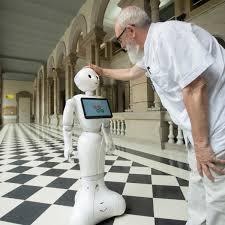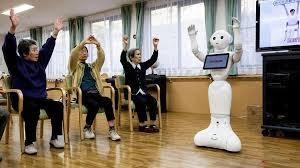
In the United Kingdom some care homes are ready to deploy robots with an intention to reduce loneliness and give a boost to mental health. These robots are wheeled machines which will initiate very basic conversations, teach the users some languages, play residents’ favourite music and offer some practical help including reminders for taking their medicines. The robots are being introduced after being showcased in International trials wherein they were found to reduce loneliness and anxiety. These robots can be programmed to people’s interests. Though these robots are being put into use as a filler for caregivers to the lonely elderly seems to be a sad state of affairs as they neither offer a permanent solution to handle the issue of loneliness nor can they replace the positive effect of human interaction.
In Japan and the United Kingdom Robot companies have been trialled using robotic dogs which sit at attention at the command of their owners to robotic human figures that greet businessmen after their long day at work. These efforts really remind people about the importance of companionship. But it is still seen that robots cannot provide the compassion and altruism which should be at the centre of a caring system. It is thought that if elderly interact with these robots for long instead of reaping benefits from these machines, the elderly will land into a deeper pit of loneliness as in the long term their interaction with actual humans would have reduced further leading to an increase sense of disconnect.


A resident robot named Ifbot was introduced in a Japanese Nursing Home in the year 2007 which sang songs, asked trivia quizzes to the elderly and provided them emotional companionship to the elderly. It was then reported by the staff that these elderly people lost interest in these robots after a month of interacting with them and instead preferred stuffed animals for interaction which can be hugged and also sometimes moulded by the shape and temperature of the human body. Robots also seem to be very mechanical many a times and also insufficient for cultural awareness.
Food for thought here is that loneliness is not just a physical affliction but also a deep mental issue which can be handled well by providing the right kind of companionship to help improve one’s health and overall well-being.
Care of the elderly and infirm is a political and cultural choice. One should remember that this section of people were and still are a part of our social fabric and extended families. Many stories come to light which show that these people are ill-treated, ignored and not well looked especially during/after pandemic. So with a globally ageing population worldover, many countries are making an effort to revisit then remodel their care homes in a way which reflects their economic, demographic and cultural needs. One needs to find the best possible solution to reduce the aspect of loneliness in these deprived sections of people which will alleviate them of their pain, agony and solitude.

